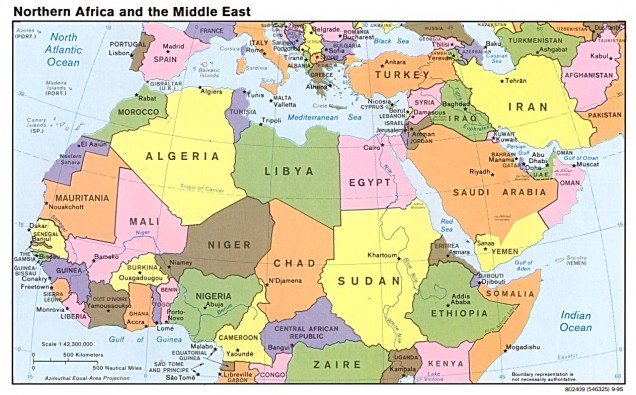
Map showing North Africa and the Middle East Credit University of Texas Libraries, The University of Texas at Austin
During early April, a high-profile meticulously-organized memorial conference was convened at the College of William & Mary – the second oldest in the United States, which educated and credentialed US Presidents Thomas Jefferson and George Washington – to salute the life and legacy of Professor James Bill. He was a top Mideast scholar and the West’s foremost authority on Iran. His landmark book, “The Eagle and the Lion,” which pinpointed US blunders, still stands out. Together, we attended a 1989 conference in Tehran.
I was asked to speak on the man and his reach, having known him for 30-plus years.
I was always struck by Bill’s integrity and intrepidity. Too much focus is placed on IQ, education, influence, and affluence, while overlooking the threshold question: is this a good human being? Other factors don’t matter if you aren’t. All else flows from that. From the outset, I had the instinctive sense of Bill being a good human being.
That gave Bill moral clarity. He shunned the elite bubble, which entraps so many academics. He chose not to be a part of the insular Washington tribe, which infests media, academia, officialdom, and think-tanks. Transcending tribalism enabled him to pursue unfettered quest for truth.
Washington is full of bright bulbs. But do they have the guts to speak Haqq? When it matters, many capitulate. Even some American Muslims are infected with the risk-averse virus, and are terrified of touching hot-button issues, under the all-purpose excuse that it might be “too controversial.”
Timidity and conformity are a scourge of American academia on the Mideast. Stances are tailored so as not to incur the wrath of powerful quarters, or to risk having investors curtail funding of programs. Not so with James Bill. He was unafraid of tackling tough issues. The 2003 attack on Iraq he compared with the 1258 sack of Baghdad by the Mongols under Hulaku Khan. 10 days before 9/11, James Bill wrote for Middle East Policy, on September 1, 2001: “The global hegemon [U.S.] continues to view Iran through lenses manufactured in Israel.”
Bill was always mindful of the perils of bypassing the core Palestinian issue. He remained a beacon for fair play in Western-Muslim relations, which almost cost him his job at the University of Texas in Austin.
No honest debate means no honest diagnosis. Without reconsideration of failed existing policies, there cannot be a pathway forward.
In evaluating the causes, consequences, and cures surrounding the Mideast conundrum, one cannot exempt Israel from critical scrutiny. Much is mentioned about Iran’s nuclear program, while overlooking the elephant in the room – Israel.
Embodying the values of humor, humanity, and honor, James Bill had the passion and compassion to pierce the veil of hypocrisy.
With the relentless march of time, so many of the hot-shot personalities of today are obliterated from public memory tomorrow. At the College of William & Mary in historic Williamsburg, Virginia, Professor Bill was the founding director of the Reves Center for International Studies. That legacy shall endure and, so too, beyond W&M, shall endure the legacy of a good man.


















